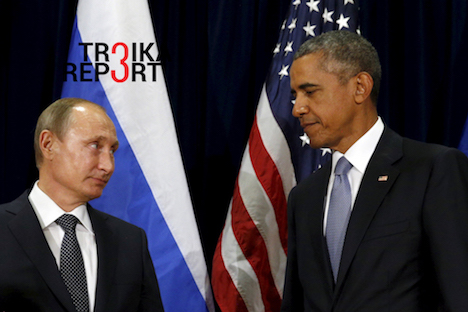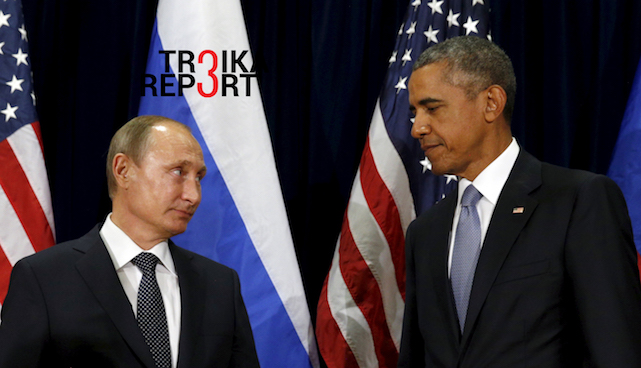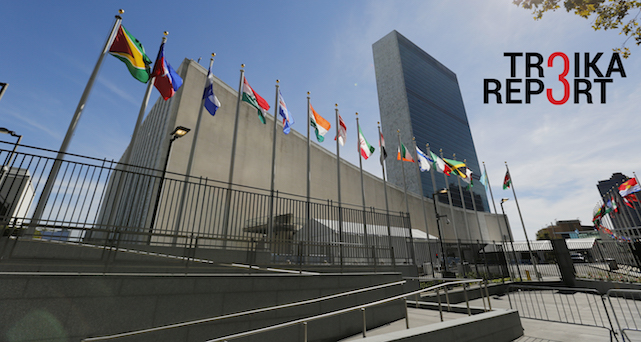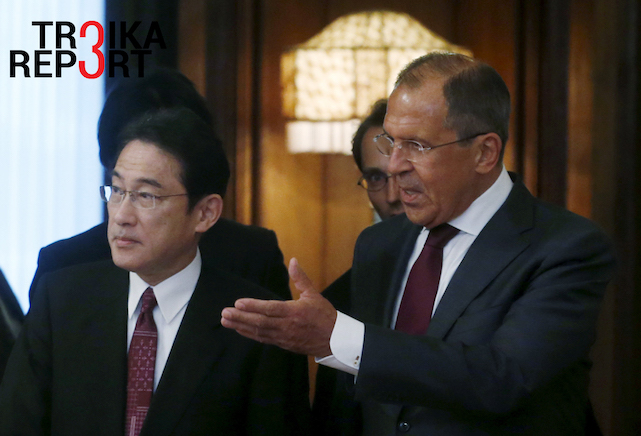

U.S. President Barack Obama and Russian President Vladimir Putin look towards one another during their meeting at the United Nations General Assembly in New York, Sept. 28, 2015. Source: Reuters
This week Russian President Vladimir Putin met his American counterpart Barack Obama on the margins of the UN General Assembly in New York, despite warnings by U.S. proponents of a hardline approach to Moscow. The fact that the talks, which lasted an hour and a half, took place, sent a tacit signal that engagement with Russia is back on track. As a clear proof comes the U.S de facto acceptance of Russian air strikes on the Islamic State targets in Syria.
The conversation put an end to a two-year pause in which the leaders talked only over the phone. Yet, until the very last minute it was not clear whether Obama would meet Putin or not. It was certainly a courageous decision, because Obama risked being mistreated as a weak leader by his Republican opponents if he did not face up to Putin.
The discussion, which exceeded the originally planned 55 minutes, came amid persistent tensions in bilateral relations over differing approaches to the Syrian issue and Moscow’s support for rebel fighters in the ongoing conflict in Ukraine.
The two leaders last met during the Belfast G8 Summit in June 2013, but dialogue was frozen long before Syria and ISIS reached the top of the agenda. The case of U.S. whistleblower Edward Snowden, who was given asylum in Moscow, strained relations, and the subsequent crisis in Ukraine resulted in Obama saying that Russia was on “the wrong side of history,” and warning that there would be “a cost” after what is seen as Russia’s takeover of Crimea.
All this considered, since the Sept. 28 meeting between the estranged world leaders finally did happen, it can be seen as one of the diplomatic events of the year.
Sources confirmed that developments in Syria dominated the discussion. Some experts assume the sudden softening of Washington’s position was largely due to the unconvincing results of the year-long campaign against ISIS by the U.S.-led coalition, which has left the question of what approach to take with the Islamic radicals hanging in the air.
Not only did the Pentagon training program for the “moderate” Syrian opposition units, costing some $500 million, produce just a handful of fighters, but recently U.S.-trained rebels from Division 30 surrendered and handed weapons over to the al-Qaeda-affiliated Jabhat al-Nusra right after crossing the border from Turkey into Syria.
Furthermore, Iraqi officials have revealed they will begin sharing “security and intelligence” information with Syria, Russia and Iran to jointly combat ISIS. This has given weight to the likelihood of an emergence of another anti-ISIS coalition.
Back in early September, U.S. Defense Secretary Ashton Carter spoke to his Russian counterpart, after a similarly long silence, about “de-conflicting” their military action in Syria, while U.S. Secretary of State John Kerry welcomed a “constructive role” by Russia in the Syrian quagmire.
After Putin’s meeting with Obama, a U.S. official confirmed that the presidents had agreed to explore options for a political solution in Syria, despite remaining at odds over the future of President Bashar al-Assad. Putin and Obama left the political dialogue on the issue to their foreign ministers and endorsed cooperation among their military.
So, what qualifies as the main outcome of the long-awaited Putin-Obama meeting? Maxim Suchkov, an expert with the Russian International Affairs Council and visiting fellow at the Center for Advanced Studies of Russia at New York University, provided his assessment of the rendezvous for Troika Report:
“I think there are at least three positive elements. First, Putin and Obama met face to face after not seeing each other for so long. I doubt they will start seeing each other on a regular basis after this encounter, but it’s nice they have exchanged opinions in person and not through their ministers.
“Secondly, it’s good they talked about substantive issues like security and concrete measures on how to deal with the Syrian mess. Differences will remain but the conversation itself is important since it was lacking for a long while amid a lot of propaganda and trash talk.
“And, finally it’s good that Lavrov and Kerry discovered opportunities that open space for the leaders to develop a positive agenda for the Middle East or Ukraine. I think that the relations are still tense and will continue to be such for a while but the parties are taking healthy measures.”
— It’s no secret that the U.S. has compelled its allies in Europe and Asia to impose diplomatic isolation on Russia. What might be the implications of this sign that Obama and Putin are back to being “on speaking terms” for the third parties?
“I certainly would share this cautious optimism. There is now a call on the Europeans to engage the Russians, both in terms of dealing with Syria and in handling the migrant crisis.”
— How far can these tactics of re-engaging Russia go?
“There might be several initiatives on which both the Europeans and Russians would work together, but it would be limited anyway. And I do not expect the lifting of sanctions soon.”
The symbolism of the rendezvous between Putin and Obama was not lost on other members of the global community. It was hardly interpreted as a diplomatic thaw but rather as a sign that too many regional hostilities have gone into stalemate.
Without a minimum correlation of actions on the ground between the U.S. and Russia, in particular in the case of curtailing the expansion of ISIS on Syrian territory, destabilized conflict zones, from the Middle East to Ukraine, will become part not of a regional but a global agenda.
Remarkably, talking to the press right after talking to Obama, Vladimir Putin sounded pretty upbeat in his assessment of the encounter: “Today’s meeting was very constructive, practical and surprisingly frank… We found a lot of common ground, but there are differences as well.”

The United Nations Headquarters General Assembly Building (L) and Secretariat Building (R) in New York City, Sept. 24, 2015. Source: EPA
The United Nations, founded 70 years ago on the ruins of World War Two, now finds itself at a historic crossroad. With glorious moments in the past and a turbulent present, it fades an uncertain future in which it will have to cope with challenging changes in a world spinning at an accelerated speed. Yet the UN has not abandoned its principles of collective governance, as Russia is consistently emphasizing.
Actually, it was one of the key points in the speech at the 70th session of the UN General Assembly by Russian President Vladimir Putin, who warned against attempts to undermine the authority and legitimacy of the United Nations. He termed attempts to rule the world unilaterally as “extremely dangerous,” for the reason it could trigger off the collapse of the entire system of international relations.
How responsive would world leaders and policymakers be to the call for unity for the sake of strengthening the mechanism of cooperation and interaction within the framework of the UN? This is not a theoretical query. Too often the UN has failed to act promptly, effectively and responsibly in dealing with regional conflicts, which have become in the last two decades the ominous hallmark of global politics.
The debate on where the United Nations is heading has never ceased, but today it has acquired a special significance given the multitude of challenges to peace and security around the world. Some claim that the UN is an obsolete institution, while others argue there is still no alternative. Troika Report asked Alexander Domrin, a professor at the Moscow-based Higher School of Economics and a visiting lecturer in several universities in the United States, where he stands in this debate:
“From the legal point of view, the UN General Assembly is sort of a consultative body. The most important decisions are taken in the UN Security Council, where the permanent member states have the right of veto. The General Assembly resembles an opinion poll. This is why it is important for the national leaders to present their views there.”
“There is no other international forum with such a degree of freedom of speech, absolute freedom of expression of opinion, as the UN General Assembly.”
“I’ve been thinking about the need, about the necessity to reform the United Nations for about 30 years. But the fact is that we do not have a better platform for the expression of the world’s opinion.”
Claims that the United Nations has passed its expiry date and should be either dumped or overhauled are as numerous as they are vociferous. Is the UN still valid? Vladimir Sotnikov, a senior research fellow at the Center for International Security at the Moscow-based Institute of World Economy and International Relations,replied to the question for Troika Report:
“I think it is still valid. Some states would criticize the UN as a rigid and bureaucratic organization. But I think that there is no alternative to the United Nations…”
“The legally binding decisions of the Unites Nations are taken by the Security Council, comprised of the five permanent member states and 10 other states, but this does not diminish the role of the organization as such in drafting and implementing the guidelines of international behavior.”
The debate on whether the UN is an outdated mechanism or a relatively useful tool for maintaining at least some semblance of global governance continues. Troika Report asked Edward Lozansky, president of the American University in Moscow (and member of the Republican Party), for his take on the issue.
“At this point, we do not have anything better. So before we dismantle the UN maybe we should come up with something more interesting. But there is nothing around. At the same time, when someone reaches the age of 70, it is a completely different world, not like in 1945. New nations have emerged, some of them pretty powerful, some nations are in decline.
“I don’t pretend that I know all the answers, but I think that the UN, even in its present shape, is still good for solving humanitarian problems: climate change, refugee crisis, and medical emergencies. The UN in this respect is doing a pretty good job and does not require any dramatic change. What the world needs is a more vigorous and effective security body. The UN Security Council is not very effective. The veto power is OK when it comes to long-term strategies but not in case of emergencies.”
“I am voting now for a new body which does not have to replace the UN Security Council. But the ‘troika’ of the United States, Russia and China can make major decisions when a crisis breaks out, when you have only 24 or 48 hours to pass a decision. Maybe at a later date other nations would join, like India, Brazil the European Union… I can refer to the example of the Yalta agreement taken by the U.S., Britain and the Soviet Union — some of the decisions taken then are valid today.”
To undo or not to undo the UN? In sum, assessing the current role of the United Nations in global affairs, it is worth paraphrasing Churchill’s definition of democracy: It’s the worst model of governance but no one has yet come up with a better idea.

Russian Foreign Minister Sergei Lavrov (R) gestures to his Japanese counterpart Fumio Kishida ahead of their meeting in Moscow, Russia, Sept. 21, 2015. Source: Reuters
Russia’s President Vladimir Putin’s meeting with Japanese Prime Minister Shinzo Abe, held on the sidelines of the 70th anniversary UN General Assembly session in New York, has added fresh speculations to what lies in store for the relations between the two major Asian-Pacific powers. Relations between the two remain strained due to the absence of a peace treaty formally acknowledging the end of hostilities in World War Two and a seven decades-long territorial dispute over the Kuril Islands, a chain of rocky islets stretching from northern Japan to Kamchatka.
While his encounter with Putin was largely overshadowed by Putin’s meeting with U.S. President Barack Obama, Abe was the only other G7 leader to meet the Russian leader face-to-face during Putin’s blitz visit to New York. It is expected that these talks will eventually set the stage for Putin’s official visit to Tokyo, which, according to Russian and Japanese sources, may take place before the end of the year.
The meeting between Putin and Abe has spurred political pundits to try to unwrap the puzzle of relations between Moscow and Tokyo, which seem to have settled into the uneasy mode of an argumentative couple. Yet the dialogue between the two Asian neighbors, despite the deadlock on the Kuril Islands and the ongoing sanctions tit-for-tat between the West and Russia, never comes to a complete halt.
Moreover, since Shinzo Abe’s recent re-election in early September as leader of the ruling Liberal Democratic party for another three years, Tokyo has only reinvigorated its efforts to change Russia’s position on the Kuril Islands, a stance which in recent years has been increasingly tough and uncompromising.
Prior to the brief tête-à-tête between Putin and Abe, Russian Foreign Minister Sergei Lavrov, meeting his Japanese counterpart Fumio Kisida in Moscow last week, made it clear: The status of the Kuril chain is “non-negotiable.” Diplomats present at the talks revealed that Kisida tensed when hearing Lavrov’s hint that Japan needed to finally come to terms with the results of World War Two. However, surprisingly. Kisida’s talks in Moscow were not seen as a disaster. The two sides have agreed to hold a round of high-ranking diplomatic consultations on Oct. 8 in Moscow.
Lavrov’s statement showed that Russia may return to the position it followed on the territorial issue during the decades of Soviet rule before Soviet leader Mikhail Gorbachev’s landmark visit to Japan in 1990, when he acknowledged that “the territorial issue exists and needs to be addressed.”
Twenty-five years later, the chances of reaching even a partial compromise on the status of the Kuril Islands seem to be wafer-thin. Still, Tokyo’s claim to these territories constitutes an inherent element of its consistent foreign policy. What is the reason for this? Could something be brewing behind the scenes?
This assumption is dismissed by Dmitry Streltsov, chair of the Oriental Studies Department at the Moscow State Institute of International Relations:
“The Japanese are preserving the illusion that both sides could start inching forward. In fact, there is no chance of any breakthrough on the territorial issue.”
“The unbending stance on this issue has sent Tokyo into a corner. The development of relations with Russia is made conditional on the progress on the territorial dossier, just like the personal achievements of any Japanese leaders on the Russian angle are judged by progress made on this issue. All through the decades, it has evolved into a problem linked to the national pride and prestige of Japan.”
“First of all, for Prime Minister Abe it is necessary to prove that he is not sitting idle and doing nothing on the Russian angle. Even if the outcome of the meeting is negative, he can still report to his party and electorate that he did his bit. The planned visit by Putin would also fall within this approach.”
“Secondly, Abe has declared the improvement of relations with Japan’s neighbors as a foreign policy goal. As a politician with a strategic vision, he realizes the need to move forward in relations with Russia, irrespective of the public opinion focused on the territorial issue.”
Indeed, Abe’s diplomacy is performing a delicate balancing act, being cautious not to spoil Tokyo’s privileged relationship with the United States while at the same time expanding room for maneuver in view of the changing balance of power in Northeast Asia.
This assessment of the challenges for Tokyo is shared by Professor Georgy Toloraya, director of the Center of Russian Strategy in Asia at the Russian Academy of Sciences, who spoke to Troika Report:
“The Japanese are at pains to slip out of the U.S. security umbrella and at the same time to mitigate their quarrels with Russia. The task is literally tearing them apart, especially given the pressure coming from the United States. However, Tokyo is now trying to play its own game, partly relying on the military factor based on the right to use force outside national boundaries. This spells the need for a multi-vector foreign policy. Without engaging Russia, such a policy would be a lame duck.”
So, here “enters the bear”, meaning Russia, which is an essential factor in ensuring stability in a region now even more prone to eruptions of animosity.
For instance, there are regular spasms of bellicose rhetoric around the Senkaku Islands, administered by Tokyo but called the Diaoyu Islands by Beijing, which claims property rights over these patches of land in the East China Sea.
For military protection, Tokyo would appeal to Washington, activating the prolonged U.S.-Japan Mutual Security Treaty, originally signed in 1951.
However, in order to increase its diplomatic leverage in dealing with Beijing, the Japanese government at one point may try to involve a third party with direct and privileged access to the Chinese leadership, and this is Russia.
As a sign of a strong undercurrent in Japanese diplomacy, dictating the urge to keep channels of communications open, the two-way flow of state officials has not dried up. Vice-Premier Arkady Dvorkovich and Director of the Federal Security Services Nikolai Patrushev are due to visit Tokyo soon.
All in all, the heated rhetoric that is then followed by rounds of active diplomacy and intensive high-level contacts reveals the major puzzle of Russian-Japanese relations: The routine quarrel over property rights on the Kuril Islands does not prevent Moscow and Tokyo from talking to each other. They do cooperate on a wide array of global issues (e.g. fighting international terrorism), and do business, like keeping the Japanese car manufacturing assembly lines running in Russia.
However, as long as bilateral relations remain hostage to the disagreement over the Kuril Islands, their development will keep stumbling over the unsigned peace treaty. This can be hardly seen as a win-win situation for Russia, as neither side will benefit from preserving this awkward status quo in the long run.
The opinion of the writers may not necessarily reflect the position of RBTH or its staff.
All rights reserved by Rossiyskaya Gazeta.
Subscribe
to our newsletter!
Get the week's best stories straight to your inbox